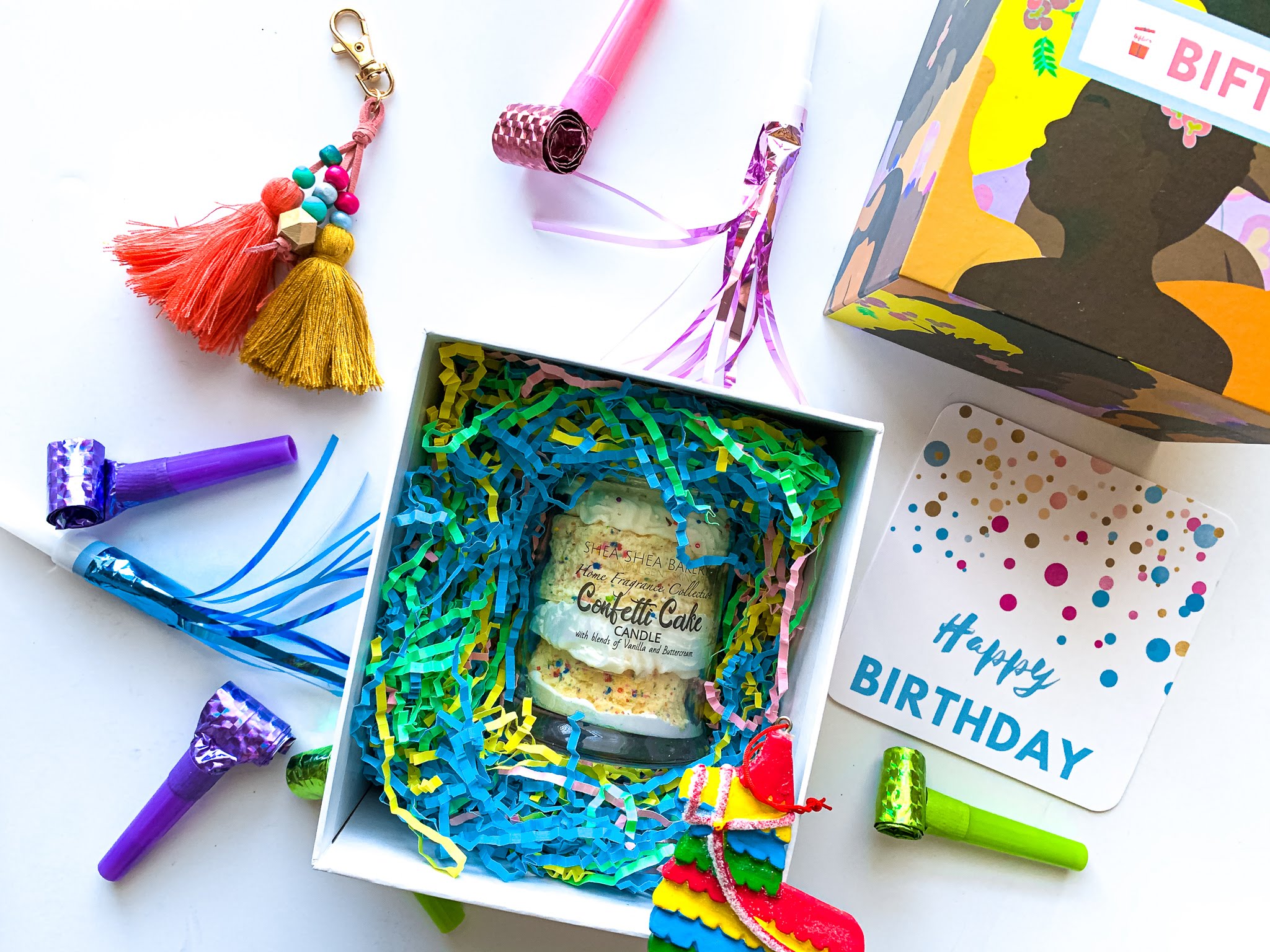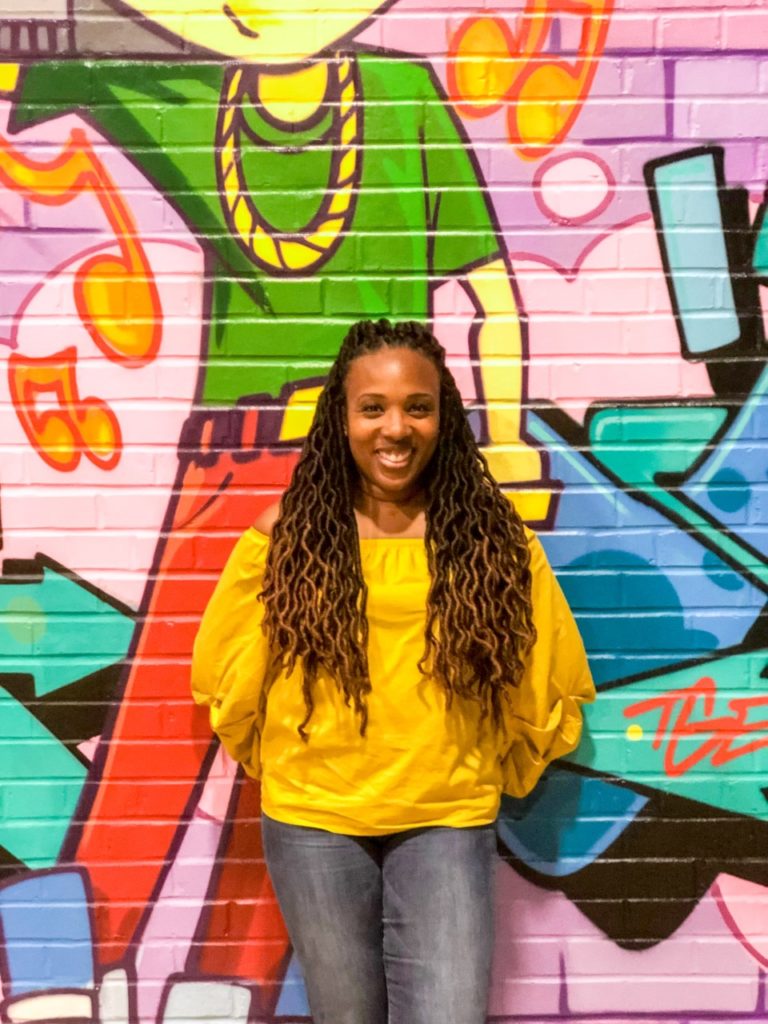It began with a 500-person holiday gift exchange that took place once a year in December and was hosted by a woman in Australia. Constance Panton joined in 2016 because she thought the idea of sending and receiving items from around the globe seemed fun. And when it delivered on her expectations, it inspired Panton to create her own gift exchange for the holiday season. But she gave hers a purpose: All the gifts had to come from Black-owned businesses. “That was my way of trying to unify the Black community,” Panton says. But the participants struggled to find businesses that fit the criteria. One woman even purchased something from Macy’s because she thought it looked multicultural. This prompted Panton to provide a list of Black-owned businesses and, ultimately, to create Bifties, an online store where all of the gifts come from Black-owned businesses.
Panton officially launched Bifties on Jan. 1, 2020, after a year of planning and preparing. The online store offers a combination of curated gift boxes for multiple occasions and the option for anyone to customize their own box. Bifties is part of an increasing market of personalized gifts that Business Wire says will reach 69% of the global market by 2022. Initially, Bifties existed as a traditional online store where customers pick a gift and a card to send. Panton had been a representative for Send Out Cards, an online business that allows you to keep a database of birthdays and reminds you to send a card, and when she created the website for Bifties, she wanted to replicate that idea. But then she discovered personalized gift boxes and knew that allowing people to choose a box that was already filled would help make giving products from Black businesses as easy as possible.
The curated boxes range from $35 to $60 with free shipping on orders of more than $55. Her most popular boxes, which sell out often, are the two curated birthday gift boxes: The Birthday Gift Box for Her, which features a confetti cake candle by Shea Shea Bakery, Audre charm bracelet by Lost Queens, a mini piñata, a lollipop, and a blank “Happy Birthday” card that you can include with a message, and the mini version which includes a confetti cake candle by Shea Shea Bakery, key chain, mini piñata, and the blank “Happy Birthday” card. Since opening, Bifties has made roughly $400 in profits per month.
Based out of Bedminster, New Jersey, Panton runs Bifties on her own and works full-time as a principal engineer at a telecommunications company. She launched the online store with $20,000 of her personal funds, which covered the website, packaging, and products. She keeps an inventory of all products sold on Bifties. Her current lineup features playing cards, coffee, nail polish, and candles. Since the start, Bifties has offered cards for every occasion. A newer addition to Bifties are cards from @nicolemariepaperie: colorful cards with fun messages on the front like “You’re Savage” or “Your Future is Bright”. Panton has so much product and packaging to build the boxes that she had to get a storage unit to hold it all. “I thought I could keep everything in my home just to save costs,” Panton says. She soon realized that coming home to boxes behind the sofa and in her bedroom wasn’t going to work.
Each of the businesses featured in Panton’s boxes have different minimums and wholesale practices, but most of the items come from small businesses and require payment up front. But the size of the businesses has allowed Panton to form relationships with many of the owners. “They’re the best. Some of them I’ve never even met in person, like they’re just internet friends but they’re really, really good,” Panton says.

The most popular of the offerings, Bifties’ birthday boxes frequently sell out. The Mini Birthday Gift Box for Her (above) includes a candle, a keychain, mini pinata, and a birthday card. (Photo courtesy of Constance Panton)
For example, Khia Jackson, the artist behind the 1998 card deck that Bifties supplies, says that when Panton first reached out, what struck her most was how easy it was to talk to her. “The biggest thing with me is she just seemed like cool people. Then that would just seem like it was spread across the brand that she was creating. So, I just liked her,” says Jackson. She also liked that Bifties served to represent Black businesses coming together to support their communities.
Panton finds the businesses she wants to include in her boxes on Instagram, and she is constantly searching for new businesses to include. Panton admits it’s easy to go down a rabbit hole looking for businesses on Instagram. “It’s just looking at other businesses and seeing who they partner with and then seeing who they partner with. And you just keep going down, down, down, down, down,” she says. Sometimes friends and gift exchange participants send Panton recommendations of products and businesses they’ve seen. “I have a particular aesthetic in my mind,” says Panton. She describes that aesthetic as “high quality items you might find in Hallmark.”
The gift box the products arrive in helps reinforce that aesthetic. The colorful package design created by Kprecia Ambers, a Minneapolis resident, is an illustration with profiles of people of color. They represent the artists and community of people who create the products you’re buying when you buy from Bifties. “Bifties is all about community, the Black community,” Panton wrote in an Instagram post. “We exist to promote, highlight, and support the innovative makers of our community and to keep the cycle of our dollars in our communities longer.”

Constance Panton founded Bifties after a gift exchange with friends made her realize how few curated-gift-box companies feature Black-owned businesses. (Photo courtesy of Constance Panton)
That emphasis on community attracted Jacqueline Carrington, the founder of People of Color Beauty, a vegan and non-toxic nail polish line created with people of color in mind. Carrington says she appreciated the unique concept and working with Panton. “It’s a way to give back to our community and then for those who support our community to be able to support us, too,” she says. As she and Panton have worked together, both attempting to grow their businesses, they have become friends, Carrington says.
In addition to creating a community of Black-owned businesses, Bifties donates 5% of their profits to I AM C.U.L.T.U.R.E.D., a nonprofit organization that focuses on encouraging kids between the ages of 15 to 18 to explore personal and professional goals through travel, mentorship, and community service. “The message overall is about diminishing hate and discrimination through exposure to different cultures and an appreciation for them,” says Karmia Berry, founder of I AM C.U.L.T.U.R.E.D. Berry started the nonprofit because of her experiences traveling when she was younger. She knew she wanted to help young adults experience the same cultural education she received when she was in high school. In addition to international trips, which due to the coronavirus have been rescheduled for 2021, I AM C.U.L.T.U.R.E.D. offers workshops to students that promote self-empowerment and teach skills that develop financial literacy, mental wellness, and the pursuit of their passion. The organization’s mission spoke to Panton when she was researching nonprofit organizations to support. The trips the students make with the organization are cause-based trips, such as a yearly trip to Ghana that supports the Abundant Grace International School. “I know the benefits of when you go somewhere else, and you see how people live,” Panton says. “You come back with a different appreciation.”
That social good component of Bifties prompted Monique Canada, a member of the original Black-owned business gift exchange that Panton started and eventually inspired her to create Bifties, to purchase a gift box for a friend’s birthday. She had participated in the pre-Bifties exchange every year and had ordered from other gift box services before, but she liked that Bifties was a social enterprise. The friend loved the gift — especially when she learned the items all came from Black-owned businesses. “I kinda want to order myself a gift so that I can feel the box and get the things,” Canada says. “I do love that they have the option to either make your own box or select the pre-selected box.” That gift exchange that Panton started back in 2016 continues to happen each year. Panton has considered not continuing it, especially now that she has Bifties to keep her busy. But when the holiday season rolls around each year, she can’t seem to let it go. It’s too much fun for everyone involved, she says. “I go into the year, saying, no, no, I’m not going to do it again,” she says. “Then it starts to become October. I’m like, no way. I’m gonna do it again.”
Featured image courtesy of Constance Panton.


